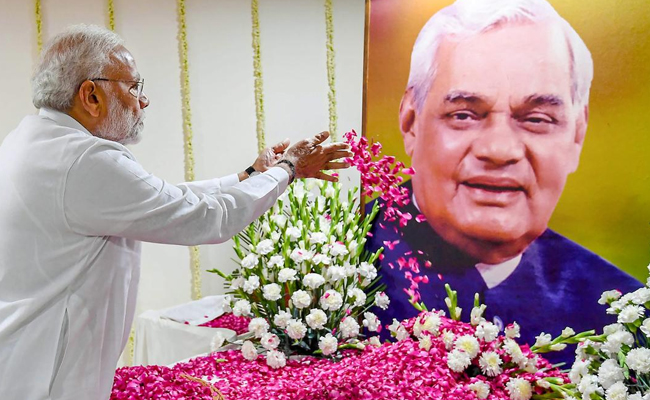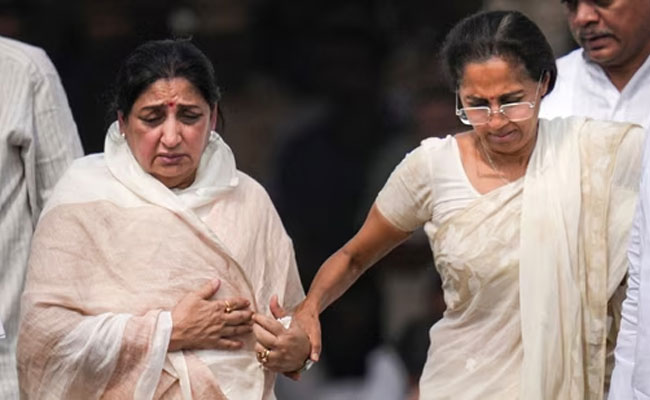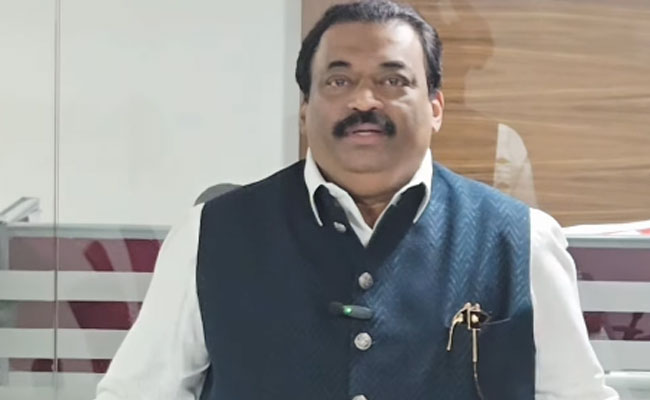New Delhi (PTI): Prime Minister Narendra Modi praised Atal Bihari Vajpayee as the architect of India's transition into the 21st century and said the BJP stalwart ushered in reforms that set the stage for India's economic surge, abandoning an economic philosophy which encouraged cronyism and stagnation.
In an article which appeared in several newspapers on the 100th birth anniversary of Vajpayee, Modi said he spent his long parliamentary tenure largely in the opposition benches but never carried any trace of bitterness even though the Congress stooped to new lows by going to the extent of calling him a "traitor".
Modi said, "He stands tall as a statesman who continues to inspire countless people."
The prime minister said Vajpayee provided stable and effective governance at a time when people were getting impatient and sceptical about the government's ability to deliver due to the political instability of the 90s when four Lok Sabha polls were held in about nine years.
Coming from humble roots, Vajpayee realised the struggles of the common citizen and the transformative power of effective governance, Modi said, adding that the long-term impact of his leadership is visible in several sectors.
His era marked a gigantic leap in the world of information technology, telecom and communications, he said.
"The NDA government under Atal ji made the first serious attempt to make technology accessible to citizens. At the same time, there was foresight in connecting India. Even today, most people recall the Golden Quadrilateral Project which connected the length and breadth of India," he said.
He also cited initiatives like the Pradhan Mantri Gram Sadak Yojana and the push for Metro connectivity by doing extensive work for the Delhi Metro, which stands out as a world-class infrastructure project.
He said, "The Vajpayee government not only boosted economic growth but also brought distant regions closer, fostering unity and integration."
An initiative like the Sarva Shiksha Abhiyan highlights how Vajpayee dreamt of building an India where modern education is accessible to people across the nation, particularly the poor and marginalised sections, he added.
His government's decision to carry out nuclear tests and its handling of the aftermath provide a wonderful example of his leadership, Modi said.
He said, "The world was stunned that India had done the tests and expressed their anger in no uncertain terms. Any ordinary leader would have buckled, but Atal ji was made differently. And what happened? India stood firm, with the government calling for another set of tests two days later, on May 13."
If the tests of May 11, 1998, showed scientific skill, the ones on May 13 showed true leadership, he said.
It was a message to the world that gone were the days when India would buckle under threats or pressure, he said.
Despite facing international sanctions, Modi said, the NDA government stood firm, articulating India's right to safeguard its sovereignty while simultaneously being the strongest proponent of world peace.
Modi said Vajpayee understood Indian democracy and also the need to make it stronger. He presided over the creation of the NDA, which redefined coalitions in Indian politics and became a force for development, national progress and regional ambitions.
"His parliamentary brilliance was seen throughout his political journey. He belonged to a party with a handful of MPs but his words were enough to rattle the might of the all-powerful Congress Party that time. As Prime Minister, he blunted the criticisms of the Opposition with style and substance," Modi said.
Vajpayee was not one to cling to power through opportunistic means. He preferred to resign in 1996 instead of following the path of horse-trading and dirty politics, the prime minister said, adding that his government fell by one vote in 1999.
Eventually, he came back with another resounding mandate from the people.
Modi said, "When it comes to commitment to protecting our Constitution too, Atal ji stands tall. He was deeply impacted by the martyrdom of Syama Prasad Mookerjee. Years later, he was a pillar of the anti-Emergency movement."
In the run-up to the 1977 elections, he agreed to the merger of his own party (Jana Sangh) into the Janata Party as safeguarding the Constitution was all that mattered to him, he said.
Modi noted that as external affairs minister, Vajpayee became the first Indian leader to speak in Hindi at the United Nations, noting that this shows how deeply rooted he was in the Indian culture.
His persona was magnetic and his life was enriched by his love for literature and expression, he said.
Modi said for so many Bharatiya Janata Party members like him, it is their privilege that they were able to learn and interact with a person like Vajpayee.
Whenever the choice came between ideology and power, Vajpayee always chose the former, Modi said.
"He was able to convince the nation that an alternative world view from the Congress was possible and such a world view could deliver," he said, asking people to rededicate themselves to realising his ideals and fulfilling his vision for India.
Let the Truth be known. If you read VB and like VB, please be a VB Supporter and Help us deliver the Truth to one and all.
Mumbai (PTI): NCP's Rajya Sabha member Sunetra Pawar will be sworn-in as the Deputy Chief Minister of Maharashtra, replacing her deceased husband and party chief Ajit Pawar, at the Lok Bhavan here at 5 pm on Saturday.
Lok Bhavan (formerly Raj Bhavan) gave this information.
Governor Acharya Devvrat, who is currently in Mussoorie, will arrive in Mumbai at 4 pm, it said.
NCP's legislature party meeting is scheduled to take place in the city at 2 pm, where Sunetra Pawar is set to be named as its leader. After that she will take oath as the first woman deputy CM of the state.
She held talks with party leaders after arriving here from Baramati early morning on Saturday.
Ajit Pawar, who was deputy chief minister and finance minister in the Devendra Fadnavis-led Mahayuti government, was killed in a plane crash in Baramati along with four others on January 28.





